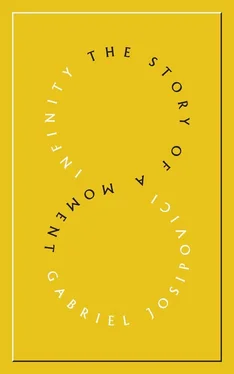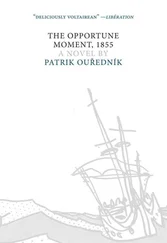Gabriel Josipovici - Infinity - The Story of a Moment
Здесь есть возможность читать онлайн «Gabriel Josipovici - Infinity - The Story of a Moment» весь текст электронной книги совершенно бесплатно (целиком полную версию без сокращений). В некоторых случаях можно слушать аудио, скачать через торрент в формате fb2 и присутствует краткое содержание. Год выпуска: 2012, ISBN: 2012, Издательство: Carcanet Press Ltd., Жанр: Современная проза, на английском языке. Описание произведения, (предисловие) а так же отзывы посетителей доступны на портале библиотеки ЛибКат.
- Название:Infinity: The Story of a Moment
- Автор:
- Издательство:Carcanet Press Ltd.
- Жанр:
- Год:2012
- ISBN:9781847776440
- Рейтинг книги:4 / 5. Голосов: 1
-
Избранное:Добавить в избранное
- Отзывы:
-
Ваша оценка:
- 80
- 1
- 2
- 3
- 4
- 5
Infinity: The Story of a Moment: краткое содержание, описание и аннотация
Предлагаем к чтению аннотацию, описание, краткое содержание или предисловие (зависит от того, что написал сам автор книги «Infinity: The Story of a Moment»). Если вы не нашли необходимую информацию о книге — напишите в комментариях, мы постараемся отыскать её.
Infinity: The Story of a Moment — читать онлайн бесплатно полную книгу (весь текст) целиком
Ниже представлен текст книги, разбитый по страницам. Система сохранения места последней прочитанной страницы, позволяет с удобством читать онлайн бесплатно книгу «Infinity: The Story of a Moment», без необходимости каждый раз заново искать на чём Вы остановились. Поставьте закладку, и сможете в любой момент перейти на страницу, на которой закончили чтение.
Интервал:
Закладка:
— What did he mean, I asked him, by a space for solitude inside himself?
— I don’t know, he said.
— He did not explain?
— You know how it is, sir. Mr Pavone talked and I listened. Especially when I was driving.
— Of course. Go on.
— Especially in later years, sir, he said, he would ask me to drive him out into the Campagna. Then he would talk. I think he felt the need to talk. Drive, Massimo, drive, he would say. If we are hungry we will stop somewhere for a bite to eat. Sometimes he was completely silent, he was thinking about his music. He would close his eyes and sit back in his seat. I could see him out of the corner of my eye. Sometimes he would make a little noise, a hum or a bark or something like la-la-la. Sometimes he would pass his hand in front of his face or make a movement of his hand as if he was trying to hold something. Then he would be still again for a long time. Perhaps he had fallen asleep. It was difficult to tell. When he walked all night he would have a long siesta during the day. Sometimes he would not get up till six or seven in the evening. At other times he liked to talk as I drove. He talked about everything. In his slow hypnotic voice. The voice of an aristocrat, if you know what I mean, sir. But also the voice of someone who is not so much talking to you as talking to himself. When we die, Massimo, he said, we should make sure we do not leave chaos behind us. That would not be fair on those who come after us. No, he said, we should leave this life with everything in order. Everything should be labelled and classified. We will turn into dust, he said, but the music will live on. Music that is genuine will always live on, he said, just as music that is not genuine will soon wither and die, even if it brought fame and wealth to its composer in his lifetime. A true musician has a duty to his music, he said. If he believes in his music then he should believe that it will live on after his death.
— Was he happy that at the end of his life his works were at last being performed? I asked him.
— He did not say, he said.
— But you must have formed an impression.
— Since you ask me, sir, I have the impression that he was happy, he said. But also that he resented the time it took up that kept him away from his music. Monsieur Balise came to see me, he said. He was a waste of time, talking to me about Marmy and about mathematics. I had had enough of that sort of talk when I studied with Scheler in Vienna, he said. Scheler made me think, he said, and thinking is the worst thing a musician can do. It took me ten years to stop thinking after I left Vienna, he said. It was only Nepal that saved me from Vienna, he said. Scheler had studied with Schoenberg, he said, that is why I went to study with him. I have always wanted nothing but the best for my music, so I picked as a teacher a pupil of Schoenberg. What I had not grasped at the time was that Schoenberg, far from advancing the cause of music, as he claimed, had set music back a hundred years with his ideas and his theories and above all with his excessive Jewish anxiety. A composer cannot be anxious, Massimo, he said. To be anxious is to live in time, he said, and the composer does not live in time, he lives in eternity. When the composer understands that eternity and the moment are one and the same thing he is on his way to becoming a real composer, he said. Without that understanding he is nothing, He can be the most intelligent man in the world and the most profound, but he is not a composer. Schoenberg and Monsieur Balise were both highly intelligent, in some ways they were geniuses, he said. Their human ears were among the best the world has ever known, but they were merely human ears and for music you need an inner ear, une oreille intérieure , he said. Have you seen photographs of Stravinsky and Schoenberg Massimo, he said. Have you noticed the size of their ears? Do you think that is merely a coincidence? It is not a coincidence, he said, the size of their ears reflects their ability to discern human sounds. But the true composer does not listen to human sounds but to the sounds of the universe. Have you seen portraits of Bach and Mozart? he said. Have you noticed their ears? I doubt if you have, he said, because the point about their ears is that they are unobtrusive ears. In other words they are normal human ears, a great deal smaller than yours, Massimo, though yours have no doubt been altered a little in the course of time by the blows life has inflicted on you. The ears of Bach and Mozart, on the other hand, he said, did not change much from their childhood to their death. They remained small, delicate, quite ordinary small and delicate ears. That is because they listened to inner and not to outer sounds. The inner ear, Massimo, that is what must be cultivated, the inner ear and the inner eye. Signor Berio came to see me, he said. He is a peasant. A man of the people. He has all the charm of the Italian peasant and all the limitations of that species. He is both innocent and cunning, he said, like the Italian peasant, who is incomparably superior to the French and the Spanish peasant, an incomparably superior human being and an incomparably superior tiller of the soil. But, he said, like the Italian peasant, Signor Berio is both lazy and self-satisfied. If he makes a beautiful sound and is paid a lot of money for doing so and the audience cheer and clap when the piece is performed he is satisfied. The curse of the age, Massimo, he said, is that people are too easily satisfied. They have forgotten how to listen with their inner ear, to listen to silence and to listen to the moment. Signor Berio justifies his large output by saying that he has to provide alimony for all his past wives, he said. Of course he says this as a joke, but there is a grain of truth in it. It never crosses his mind that he should not have married so many wives because, like the Italian peasant, he is at heart a sensualist. He feels that it is his right to sleep with a woman and to take his pleasure with her, it is his right that she should darn his socks and cook his meals. But it is not a right, Massimo, he said. That is why I have hired you, so that you can make sure I have a sufficient number of socks and that my shirts and ties and suits are always clean and freshly ironed. I pay you a great deal of money, Massimo, he said, and I pay Annamaria a great deal of money, but even so I pay less than Signor Berio spends on alimony to all his past wives. Monsieur Balise at least is not a sensualist, he said, but he is in the end what amounts to the same thing, he is an ascetic. He prides himself on living in hotels and out of a suitcase. He prides himself on having nothing to do with the bourgeois comforts of a family and a home. But he is in fact a living exemplar of what Ni Che described as the priestly spirit, the spirit of ressentiment . For he uses his asceticism as an instrument of power and he is not satisfied unless he has absolute power in the world of music. Signor Berio came to see me and drink wine with me in a spirit of peasant comradeliness, he said, and Monsieur Balise came to see me to exert his power over me. It all amounts to the same thing, he said. It all amounts to the negation of the spirit of music. Now I am famous, he said, and the world runs to my door, it expects me to throw that door wide open. But why should I do that? Why should I talk to these people and let them photograph my nose?
— Did he feel, I asked him, that hearing his own works played at last made a difference to his conception of them?
— No, sir, it made no difference, he said. He was very clear on that point. He said to me: When you are a real musician, Massimo, a real musician and hear with your inner and not your outer ear, then it makes no difference whether the works are performed or not. Of course, he said, it is of interest to hear with your outer ear what you have heard so far only with your inner ear. When I wrote my early work Sparagmos , for organ and two orchestras, I was curious to hear how it would sound in the concert hall, for many years I was only able to imagine it. But when I became famous I heard it at last for the first time at the Donaueschingen Festival. And I have to say I was disappointed. The organist did not know what he was doing and the two conductors did not know what they were doing and the players knew only how to do what players are trained to do, that is to play the notes put in front of them. After that I forbade anyone to play Sparagmos and contented myself with listening to it as I have always done, with my inner ear. In Venice in 1973, he said, after I had been, as they say, ‘rediscovered’, they gave a performance of my large orchestral work, Shi . Mazzini was to conduct it, a man I had known since the 30s, a real musician. Then I learned that he had broken his leg and that Milan Barras was to conduct it. He was in Cleveland, but we spoke on the telephone and it seemed to me that he had a clear idea of what needed to be done. But the next thing I heard was that he had picked up an ear infection and that he had handed over responsibility to a younger colleague, Sandor Balint. I did not hear a word from this man who was after all going to conduct a long and difficult new work, but the people in Venice assured me that he was the right person and that we would have ample chance to discuss matters in the two days he would be in Venice before the performance. However, when I got to Venice there was no sign of him and no one knew where he was. On the evening before the concert he contacted me at my hotel and said that he was on his way and that all would be well, he had worked with this orchestra before and he would give them three hours of rehearsal time, which would be ample. I got to the rehearsal at the time he had given me but there was no sign of him or of the orchestra. One hour later they began to drift in and half an hour after that Balint himself appeared, smiling and cheerful. It was too late to remonstrate with him, so I sat in the back and listened. It soon became clear that neither the conductor nor the orchestra had any idea of what the music was about. You can imagine how I felt, he said. It was all I could do to drag myself to my hotel and lie down to try and recover a bit of calm. I had already decided to pack my suitcase and head for home when Cassini, who had organised the whole thing in the first place, turned up and set about reassuring me. Like a fool I listened to him and, with a heavy heart, got myself ready. But when I reached the hall I could not go in. I left Cassini and rushed out into the street. I walked through the streets and up and down the canals for a long time, and eventually I began to calm down. At that moment I found myself walking past one of my favourite restaurants. I entered and was greeted with great warmth by the proprietor. Here at last, Massimo, he said, was an environment in which I could thrive. Needless to say, I was given a most excellent meal, so that I was able almost to forget the horrors of the performance of my work. Now I call the work Chie , not Shi , he said, because after Balint and his musicians had shat on it I had no wish ever to hear it again. But it is always the same, he said, unless you have a really dedicated musician prepared to work with you they will shit on your work and make shit of your work. That is one of the iron laws of performance, Massimo, he said. When I was in Nepal, he said, I heard some of the music they play in their religious ceremonies. To become a performer in a temple in Nepal and Tibet, he said, you have to undergo a rigorous training, not just a training in musicianship but a training in spirituality. The ears of the West cannot tell the difference between a trumpet blown by a spiritual person and a trumpet blown by a non-spiritual person, but the difference is everything, Massimo, he said, the difference is everything.
Читать дальшеИнтервал:
Закладка:
Похожие книги на «Infinity: The Story of a Moment»
Представляем Вашему вниманию похожие книги на «Infinity: The Story of a Moment» списком для выбора. Мы отобрали схожую по названию и смыслу литературу в надежде предоставить читателям больше вариантов отыскать новые, интересные, ещё непрочитанные произведения.
Обсуждение, отзывы о книге «Infinity: The Story of a Moment» и просто собственные мнения читателей. Оставьте ваши комментарии, напишите, что Вы думаете о произведении, его смысле или главных героях. Укажите что конкретно понравилось, а что нет, и почему Вы так считаете.












